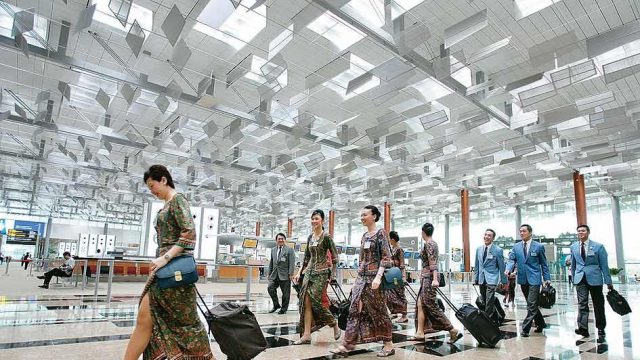Being an aviation correspondent isn’t easy. It’s made more difficult by the fact that when I’m off the job I’d have to save for a couple of months to buy international coach class tickets, while on the job I’m expected to judge different first-class menus, evaluate business-class seats across airlines, and pretend to be a connoisseur of vintage wines.
On the flip side though, I get a behind-the-scenes look at the airline business. It’s an immensely demanding, precise and competitive business — something you only truly realise and appreciate when you visit a flight kitchen, or talk to an airline manager.
So in the line of duty I recently flew down to Singapore. Singapore Airlines was bringing its latest cabin products to India on board their Boeing 777-300ER, and they were keen on showing them to a group of journalists.
We were, of course, flying business class. I spent the first hour of the late-night flight examining the surroundings. The 30-inch wide plush leather seats could have seated three people, stowage areas for magazines and personal odds and ends were built into various corners of the seats, the large adjustable table made a comfortable workstation, and a vanity mirror was placed besides the 15.4-inch screen, so that you didn’t have to make that extra trip to the bathroom.
Five hours later we were in Singapore. It was time for a short tour of Terminal 3, the latest addition to the Changi airport. If it weren’t for the strong air-conditioning it could have passed off for a tropical garden — a huge vertical sheet of green shrubs rose up to the ceiling. The duty-free area was the size of a mall, and quite unusually, most of the airport was carpeted.
Next, we moved on to the Singapore Airport Terminal Services (SATS) Inflight Catering Centre (SICC). A board at the entrance gave statistics for June 2008: “SATS produced 21,57,098 meals with a cargo tonnage of 1,32,425.” Huge trucks deposited raw material (everything from Caspian caviar to fruits and vegetables) at SICC 1 — the receiving base, where the material was re-sorted and repackaged. A complicated mechanised system then transported it to either the storage area or to SICC 2, the cooking and repackaging centre, where another incredibly elaborate set of procedures kicked in, transporting the right ingredients to the right industrial-size kitchen (first class, Indian, Japanese, Muslim, etc.).
“It doesn’t end there,” said Brian Yeap, who was showing us around SICC. “We’ve got a Simulator Aircraft Cabin at SICC which simulates a aircraft cabin at 36,000ft. That’s where we do our food tasting. Food can taste very different in a pressurised cabin at that height. It takes the simulator 20 minutes to reach that height, and the same amount of time to descend!”
Later in the day we made a trip to the SIA Training Centre — the source of the eponymous Singapore Girl, and the place where all Singapore Airlines staff is trained. There we spoke to senior management about the airline’s expansion plans, their efforts to reduce weight by creating new composite materials for plates, the differences between their approach and that of other competitor airlines (why, for example, they don’t have massage functions on their business class seats), etc.
Finally, at the end of a very long day, we went to that giant observation wheel — the Singapore Flyer, for a bit of sightseeing. The next morning we were back on a flight to Delhi. We were flying business class — where you have three windows instead of one to look out, where the food is fantastic and the entertainment even better — but I was fast asleep before the plane had even left the ground.




